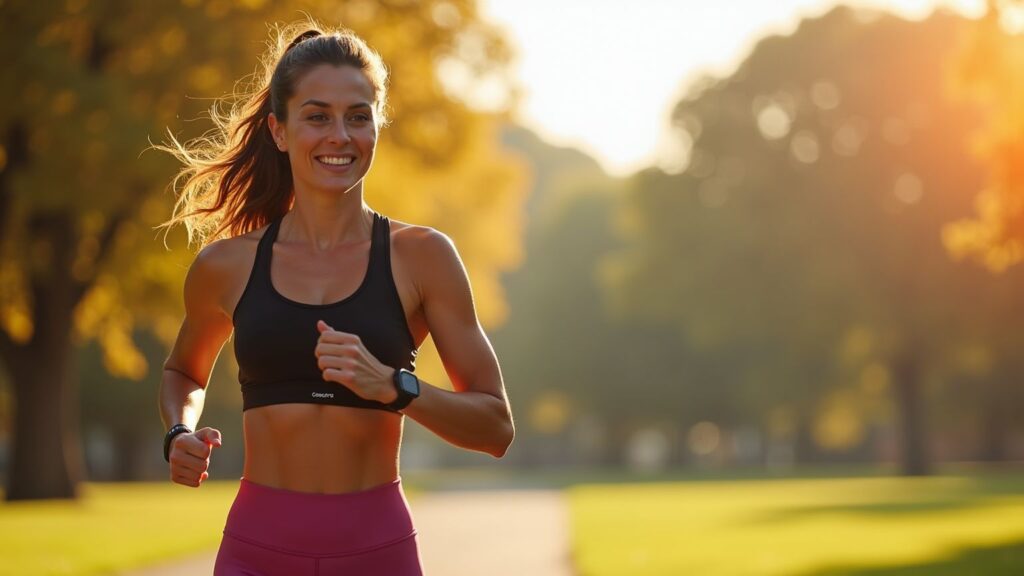Revolutionizing Workouts: How AI in Fitness Apps is Changing the Game
Picture this: You’ve got a personal trainer, nutritionist, and motivational coach, all rolled into one—and they’re available 24/7. No appointments,…

Picture this: You’ve got a personal trainer, nutritionist, and motivational coach, all rolled into one—and they’re available 24/7. No appointments, no hefty bills, and no judgment.
Sounds too good to be true? With AI-powered fitness apps, it’s already a reality.
Artificial Intelligence (AI) is transforming the fitness world by making expert-level guidance accessible to everyone.
These apps are more than just tools; they’re your workout buddy, form coach, and health advisor all in one. In this article, we’ll explore how AI in fitness apps is personalizing workouts, enhancing motivation, and shaping the future of health and wellness.
Why AI in fitness apps is the Perfect Workout Buddy

Let’s face it: finding the right workout routine can feel like searching for a needle in a haystack.
What works for your friend might not suit your body, schedule, or goals. That’s where AI steps in as the ultimate workout buddy, customizing your fitness journey like it’s tailored just for you.
AI in fitness apps uses machine learning to analyze your fitness level, preferences, and even feedback. For example, apps like MyFitnessPal adjust your workout plans based on your progress—whether you’re smashing your step goals or struggling to keep up. Imagine this: You complete a week of cardio, and the app suggests a new strength-training routine to keep things fresh. It’s smart enough to challenge you without overwhelming you.
I remember using an AI-powered app when I was just starting out. It recommended beginner-friendly circuits but gradually upped the ante as I got stronger. The best part? It celebrated small wins, like completing three workouts in a row, which kept me motivated.
Studies show that personalized fitness plans improve adherence rates by 60%. This means you’re more likely to stick with your workouts if they’re designed specifically for you.
Tracking More Than Just Steps
Remember when fitness tracking meant simply counting steps? Those days are long gone. Thanks to AI, fitness apps now track a wealth of data—heart rate, sleep patterns, calorie burn, and even your stress levels. It’s like carrying a health lab in your pocket!
Apps like Fitbit and Apple Health have transformed tracking into an art form, using AI to interpret the data and provide actionable insights. For instance, if your app notices a dip in your sleep quality, it might recommend relaxation exercises before bed. Struggling with low energy during workouts? AI can analyze your diet and suggest tweaks for better results.
I once used an app to monitor my sleep and realized I was clocking in far less rest than I thought. By following its tips—like avoiding screen time before bed—I saw improvements not just in my energy levels but in my workout performance, too.
A report by McKinsey revealed that 40% of fitness app users felt more confident about their health decisions thanks to AI-driven insights. The takeaway? AI doesn’t just track; it empowers you to take control of your health.
Pro Tip: Sync your wearable devices with an AI-powered app to get a complete picture of your fitness and well-being.
AI-Powered Motivation: Keeping You on Track
We’ve all been there—waking up to workout but hitting snooze instead. Staying consistent is one of the hardest parts of any fitness journey, but AI is here to help with that, too.
One way AI keeps you motivated is through gamification. Apps like Zombies, Run! turn your workouts into interactive games, making exercise feel less like a chore and more like an adventure. Others, like Strava, encourage friendly competition by letting you challenge friends or join global fitness communities.
But it doesn’t stop there. AI in fitness apps use behavioral insights to send timely reminders or motivational nudges. It might say, “You’ve completed 3 workouts this week—let’s make it 4!” Or it could highlight progress, like burning 500 calories more than last week, to keep you pumped.
I’ll admit, I was skeptical about gamified workouts until I tried a running app that turned every jog into a race against virtual zombies. The adrenaline rush was real, and I ended up running farther than ever before!
Studies have shown that people using gamified fitness apps increase their activity levels by 30%. That’s the power of AI-driven motivation.
Real-Time Feedback for Perfect Form
If you’ve ever tried a new workout routine, you know the struggle—“Am I doing this right?” It’s a question that echoes in our minds when attempting everything from yoga poses to weightlifting moves. Enter AI-powered fitness apps, the personal trainers that fit in your pocket. These apps don’t just guide you through workouts; they analyze your movements in real time to ensure every rep counts and every stretch is safe.
Take, for instance, AI using computer vision technology. Apps like Freeletics or VFitness employ your phone’s camera to track your form. They compare your movements against optimized models and provide instant corrections like, “Keep your back straight,” or “Lower your hips.” This not only prevents injuries but also maximizes the efficiency of your workouts.
I’ve benefited from this while practicing squats. An app pointed out that my knees were caving in—a common mistake—and helped me adjust my stance. Within weeks, I noticed improved strength and no knee discomfort. The best part? I didn’t need an expensive gym membership or in-person trainer to get results.
A study published in Sports Medicine highlights that real-time feedback improves performance by 25% compared to self-corrected routines. This makes AI an invaluable tool for anyone looking to up their fitness game.
Pro Tip: If you’re exploring these apps, look for ones that support live feedback during video workouts. It’s like having a coach’s watchful eye—minus the intimidating whistle.
The Future of AI in Fitness Apps
So, what’s next for AI in fitness apps? If current trends are any indication, the future is nothing short of revolutionary.
One exciting development is the integration of virtual reality (VR) with AI. Imagine putting on a VR headset and stepping into a virtual gym, complete with AI trainers who guide you through immersive workouts. AI is also making strides in mental health, with apps like Calm and Headspace blending mindfulness with fitness routines to create a holistic wellness experience.
There’s also buzz around AI fitness assistants that act like real-life trainers, offering detailed feedback on everything from your diet to your recovery routine. These assistants are expected to use biometric data, like muscle activity, to create ultra-personalized plans.
I recently tried a prototype VR fitness app, and let me tell you—it was mind-blowing. Running through a scenic virtual trail while an AI coach tracked my pace felt like a glimpse into the future of fitness.
Experts predict the AI fitness market will grow exponentially, reaching $30 billion by 2030. This growth reflects how deeply technology is becoming embedded in our health routines.
Conclusion
AI in fitness apps isn’t just a passing trend—it’s a revolution in how we approach health and wellness. From personalized workouts to advanced tracking and real-time feedback, these apps empower us to achieve our fitness goals with precision and convenience. Whether you’re a beginner looking to build consistency or a fitness enthusiast aiming to fine-tune your routine, AI has something to offer.
So why wait? Embrace the future of fitness and let AI guide you toward a healthier, stronger version of yourself. Because when technology and determination combine, the possibilities are endless!
